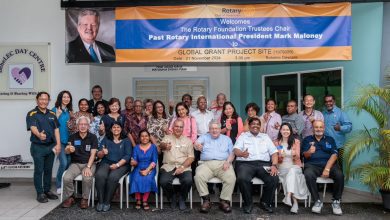

Dr Cheang Chee Keong, Consultant Neurosurgeon, KPJ Ipoh Specialist Hospital shared with me this big shocker when he pointed to the illustration of what most people do with their mobile phones: which is bending the neck at an unnatural angle, causing most of the current epidemic of spinal degeneration.
Referring to the illustration below, he used a most vivid analogy when he said that the way most people today are glued to their phones is the equivalent of having 3 full bags of rice stressing on the joints of their neck bones.


“All this stress causes degenerative spinal disease, as the intervertebral discs lose their water, bringing the vertebrae closer together. As a result, the nerve openings in your spine become more narrow. When this happens, the discs don’t absorb the shocks as well, particularly when you are walking, running, or jumping. Wear and tear, poor posture, and incorrect body movements can also weaken the disc, causing disc degeneration.
“For some of us, degenerative disc disease is part of the natural process of growing older. As we age, our intervertebral discs can lose their flexibility, elasticity, and shock-absorbing characteristics. For others, degenerative disc disease can stem from an injury to the back.
“And now with the new digital devices that we are all addicted to, this degeneration is further exacerbated and more and more people are in pain. I have 20-30 year olds coming to me with pain and numbness and pain in their neck and upper limbs.
“Oftentimes, surgery is the last resort after conservative treatment with pain medication and other non-invasive methods have been tried,” he added.




TLIF or a transforaminal lumbar interbody fusion is a type of spine surgery that involves approaching the spine from the back of the body to place bone graft between two vertebrae. The procedure may be performed using minimally invasive surgical techniques. (Refer to picture of minimal vs open surgery and the scar left as result). With this, patients can return home after a day or two in the hospital and suffer minimal postoperative discomfort.
Sometimes, all that needs to be done when a patient presents with spine degeneration is to have injections to their neck joint, epidural, nerve roots or discs. Injections using “Discogel” to rehydrate the discs, radio frequency ablation of the disc, laser therapy of the disc are all simple procedures to relieve pain.
Dr. Cheang should know as he is a faculty member of AO Spine International, an international community of spine surgeons generating, distributing, and exchanging knowledge to advance science and the spine care profession through research, education, and community development. With this collaborative approach AOSpine continues to advance spine care worldwide.
Dr Cheang received his MBBS (UM) and M.S (UKM) and specialist training in Neurological Surgery at the Royal Melbourne Hospital, before joining KPJ Ipoh Specialist Hospital a year ago. Previously he was head of department Neurosurgery at Hospital Raja Permaisuri Bainun Ipoh. His field of interest in addition to general neurosurgery is in vascular and spinal degeneration, with Cerebral Aneurysm and minimally invasive spinal surgery his pet specialties.
Dr Cheang’s advice for avoiding spinal degenerative problems for people of all ages is, “You can’t avoid degenerative spinal disease due to disease or accidents but please don’t hasten it with poor general posture, no exercise and most importantly, bad posture habits regarding using digital devices. You can avoid coming to see me if you follow these tips!”
Dr Cheang Chee Keong’s clinic: Consultant Neurosurgeon Suite 2-05, KPJ Ipoh Specialist Hospital, 26, Jalan Raja Dihilir, 30350 Ipoh. Tel: 05 240 8777 (Ext 131, 132)


